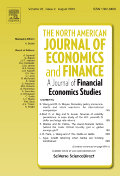
North American Journal of Economics and Finance
Scope & Guideline
Uncovering insights in finance and economics.
Introduction
Aims and Scopes
- Empirical Analysis of Financial Markets:
The journal publishes research that employs empirical methods to analyze financial markets, including stock, bond, and commodity markets. This includes studies on market volatility, risk management, and the effects of macroeconomic factors. - Interconnectedness of Financial Systems:
Research exploring the interconnectedness of financial markets, including contagion effects, spillover analysis, and the impact of global economic events on local markets is a core focus area. - Sustainable Finance and ESG:
The journal emphasizes studies related to sustainable finance, environmental, social, and governance (ESG) criteria, and their implications for investment strategies and corporate behavior. - Innovative Financial Instruments and Risk Management:
There is a significant focus on the valuation and risk management of innovative financial instruments, such as derivatives, options, and cryptocurrencies, which reflects the evolving landscape of the finance industry. - Behavioral Finance:
The journal also addresses behavioral finance, examining how psychological factors influence investor behavior and market dynamics, contributing to a deeper understanding of market anomalies. - Policy Analysis and Economic Modeling:
The journal aims to provide insights into economic policy through rigorous modeling and analysis, particularly how policies affect financial stability, market efficiency, and economic growth.
Trending and Emerging
- Cryptocurrencies and Digital Assets:
Recent publications indicate a growing interest in cryptocurrencies and digital assets, exploring their role in investment portfolios, risk management, and market behavior, especially in response to global events. - Environmental Finance and Climate Risk:
There is a significant increase in research focusing on climate risk and its impact on financial markets, as well as the role of green bonds and sustainable investment strategies in mitigating these risks. - Machine Learning and AI in Finance:
The application of machine learning and artificial intelligence in financial modeling, forecasting, and risk assessment is emerging as a key area of research, demonstrating the integration of technology in finance. - Behavioral Insights in Financial Decision-Making:
Studies examining the psychological factors that influence investor behavior and market outcomes are becoming increasingly prevalent, reflecting a shift towards understanding behavioral finance. - Impact of Global Events on Financial Stability:
Research analyzing the effects of global events, such as pandemics and geopolitical risks, on financial stability and market dynamics is gaining importance, highlighting the interconnectedness of global markets.
Declining or Waning
- Traditional Economic Theories:
There has been a noticeable decrease in the publication of papers strictly adhering to traditional economic theories, as newer methodologies and interdisciplinary approaches gain traction. - Static Risk Assessment Models:
Static models of risk assessment that do not incorporate time-varying dynamics or behavioral factors are appearing less frequently, indicating a shift towards more dynamic and complex models. - Narrow Regional Focus:
Research focusing solely on specific local or regional markets without considering global interconnectedness is becoming less common, as the journal increasingly emphasizes broader, comparative analyses. - Purely Theoretical Studies:
The journal is moving away from purely theoretical studies that do not include empirical testing or practical applications, reflecting a preference for research that provides actionable insights. - Conventional Portfolio Management Strategies:
There is a decline in papers discussing conventional portfolio management strategies, as the focus shifts towards innovative strategies that incorporate behavioral finance and machine learning techniques.
Similar Journals
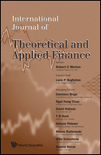
International Journal of Theoretical and Applied Finance
Unveiling the nuances of theoretical and applied finance.International Journal of Theoretical and Applied Finance is a distinguished publication in the field of finance, serving as a critical platform for the dissemination of innovative research and theoretical insights since its inception in 2003. Published by World Scientific Publishing Co Pte Ltd in Singapore, this journal boasts an impressive Q2 ranking in the realms of Economics, Econometrics, and Finance (miscellaneous) and a solid Q3 status in Finance for 2023. With a commitment to advancing knowledge in the complex world of theoretical frameworks and applied financial practices, it welcomes original research articles, comprehensive reviews, and case studies that explore varied facets of finance. Researchers, professionals, and students benefit from the journal's rigorous peer-review process and an ever-expanding repository of knowledge, making it an indispensable resource in the financial academic community. The journal does not currently offer open access, reflecting its selective approach to publishing high-quality content aimed at a specialized audience.
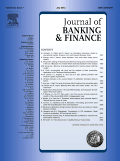
JOURNAL OF BANKING & FINANCE
Advancing the Frontiers of Financial KnowledgeWelcome to the Journal of Banking & Finance, a premier publication in the fields of finance and economics, expertly published by Elsevier. With its esteemed Q1 ranking in both the Economics and Econometrics and Finance categories for 2023, this journal frequently garners significant attention from researchers, professionals, and academics alike. Established in 1977, it has become a crucial resource for the latest research and advancements in banking and financial services, influencing policies and practices on a global scale. The journal's commitment to high-quality, peer-reviewed content ensures that it not only contributes to academic discourse but also drives real-world financial innovation. As part of the respected Elsevier publishing collection, the journal's rigorous standards and comprehensive analysis serve as indispensable tools for those seeking to understand and navigate the complexities of the financial landscape. Located in the Netherlands, the Journal of Banking & Finance continues to play a vital role in shaping the future of financial research through its impactful insights and research contributions.
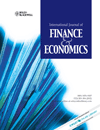
INTERNATIONAL JOURNAL OF FINANCE & ECONOMICS
Catalyzing Research in Global Financial LandscapesInternational Journal of Finance & Economics, published by Wiley, is a premier academic journal that serves as a vital resource for researchers and professionals in the fields of finance, accounting, and economics. With an impressive impact factor and a reputation for excellence, the journal is recognized in the 2023 Scopus rankings, placing in the top quartiles across multiple categories, including Q2 in Accounting, Economics, and Finance. The journal has been a significant contributor to academic discourse since its inception in 1996, with its converged years extending to 2024, thereby ensuring the continuous advancement of knowledge in these critical areas. Although it operates under a traditional subscription model, its comprehensive articles provide insightful analyses, empirical research, and theoretical advancements that cater to a diverse audience—from seasoned scholars to emerging students in the field.
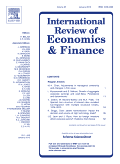
International Review of Economics & Finance
Exploring New Horizons in Economics and Finance.International Review of Economics & Finance is a premier academic journal published by ELSEVIER, dedicated to advancing the fields of economics and finance through high-quality, peer-reviewed research. With a distinguished history dating back to 1992 and set to continue until 2024, this journal holds an impressive Q1 ranking in both Economics and Econometrics and Finance categories as of 2023, showcasing its influential role in shaping scholarly discussions. The journal’s focus on empirical and theoretical advancements makes it an essential resource for researchers, professionals, and students seeking to understand and engage with cutting-edge economic and financial theories. Indexed in Scopus, the journal ranks in the top tiers for both finance and economics, underscoring its global impact within these disciplines. Although it does not offer open access, the journal remains committed to disseminating vital insights and fostering ongoing dialogue in the academic community.

Review of Pacific Basin Financial Markets and Policies
Fostering Innovation in Financial Policies and MarketsThe Review of Pacific Basin Financial Markets and Policies is a prominent academic journal dedicated to exploring the dynamic landscape of financial markets and policies within the Pacific Basin region. Published by World Scientific Publishing Co. Pte Ltd and based in Singapore, this journal serves as a vital platform for researchers, professionals, and students interested in the intricacies of finance and economics. With an ISSN of 0219-0915 and E-ISSN 1793-6705, it encompasses a broad scope addressing critical issues and emerging trends from 2003 to 2024. Despite its current positioning within the Q4 quartile for both Economics and Econometrics as well as Finance, the journal fosters invaluable contributions that encourage scholarly communication and innovation. Access to the journal is through various academic libraries and institutions, providing an essential resource for those seeking to enhance their understanding of the financial frameworks in the Pacific region.
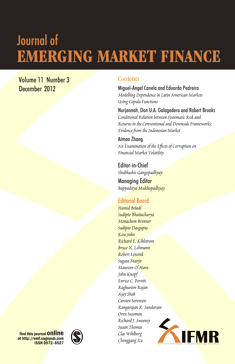
Journal of Emerging Market Finance
Navigating the Complexities of Financial SystemsThe Journal of Emerging Market Finance, published by SAGE Publications India Pvt Ltd, is a premier academic journal that serves as a vital resource for researchers, professionals, and students in the fields of finance and economics. Established in 2002, this journal focuses on the multifaceted dynamics of emerging market economies and their financial systems. With an ISSN of 0972-6527 and an E-ISSN of 0973-0710, it has garnered attention with its respectable Q3 rankings in both the Economics and Econometrics and Finance categories, reflecting its commitment to high-quality research. Despite its limited open-access options, the journal remains a significant platform for scholarly discussions, providing insights on emerging financial instruments, market behaviors, and economic policies in developing economies. As a continuously evolving publication, it aims to bridge the gap between theory and practice, promoting an understanding of the complexities faced in these vibrant markets, ultimately serving the academic community with relevant and impactful research until 2024 and beyond.
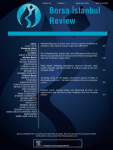
Borsa Istanbul Review
Connecting scholars to the evolving economic landscape.Borsa Istanbul Review, published by ELSEVIER, is a premier open-access journal making significant contributions to the field of Economics and Finance since its inception in 2013. With a commendable Q1 rating in both categories according to the 2023 metrics, this journal ranks impressively at #36 out of 317 in Finance and #91 out of 716 in Economics and Econometrics on Scopus, placing it in the top tier of international academic publications. The journal not only provides a platform for rigorous and innovative research but also aims to foster a deeper understanding of the evolving economic landscape, particularly within the frameworks of emerging markets. Catering to researchers, professionals, and students alike, Borsa Istanbul Review is dedicated to delivering high-quality, peer-reviewed scholarly articles that are freely accessible to enhance global research collaboration. It serves as an essential resource for anyone looking to stay abreast of cutting-edge developments in the financial and economic sectors.
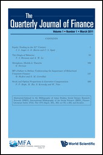
Quarterly Journal of Finance
Innovating Strategies, Shaping Financial FuturesThe Quarterly Journal of Finance, published by World Scientific Publishing Co. Pte Ltd, serves as a vital resource for the global academic community in the fields of Finance, Economics, and Strategy and Management. With an ISSN of 2010-1392 and E-ISSN 2010-1406, this journal boasts a respectable impact factor reflective of its standing, being ranked in the Q2 quartile across multiple categories in 2023. The journal's diverse scope includes innovative research and critical reviews that address current issues in financial practices and economic strategies, making it a pertinent platform for scholars and industry professionals alike. Despite its lack of open access, the journal's rigorous selection process ensures the publication of high-quality, impactful research. The Quarterly Journal of Finance is particularly distinguished for its commitment to advancing knowledge and fostering dialogues within its converging fields, proving to be an indispensable asset for researchers, professionals, and students eager to stay abreast of developments from 2011 to 2024 and beyond.

Pacific-Basin Finance Journal
Connecting Research and Practice in Pacific FinancePacific-Basin Finance Journal is a prestigious academic journal that focuses on critical developments and innovative research within the fields of finance and economics, specifically tailored to the Pacific region's unique economic landscape. Published by Elsevier, the journal boasts an impressive impact factor and is categorized in the Q1 quartile for both Economics and Econometrics and Finance as of 2023. This indicates its high relevance and position among the top journals in its field, with Scopus rankings reflecting a strong standing in the competitive landscape of finance research, holding the 45th position out of 317 in Finance and the 108th in Econometrics. Established in 1993, the journal is committed to disseminating rigorous theoretical and empirical research findings that enhance the understanding of financial systems in the Pacific Basin. Although the journal is not open access, it provides invaluable insights and comprehensive studies aimed at professionals, researchers, and students alike, fostering a deeper comprehension of the region's economic dynamics and global interconnectedness.
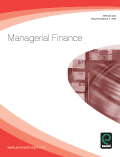
MANAGERIAL FINANCE
Advancing Knowledge in Managerial Decision-Making.MANAGERIAL FINANCE is a prestigious academic journal published by Emerald Group Publishing Ltd, focused on the areas of finance, management, and strategy. With an ISSN of 0307-4358 and an E-ISSN of 1758-7743, this journal has carved a niche for itself within the business and financial sectors, achieving a commendable Q2 category ranking across multiple domains, including Business, Management and Accounting, Finance, and Strategy and Management, as of 2023. The journal aims to provide a platform for insightful research and critical analysis while fostering an understanding of contemporary financial practices and theories. With its wide-ranging scope, it serves as a vital resource for researchers, professionals, and students alike, looking to stay abreast of the latest trends and challenges in managerial finance. The editorial board is committed to maintaining academic rigor, ensuring that articles published are of the highest quality and relevance to the field. By bridging the gap between theory and practice, MANAGERIAL FINANCE is an essential reference for anyone involved in financial decision-making and strategic management.